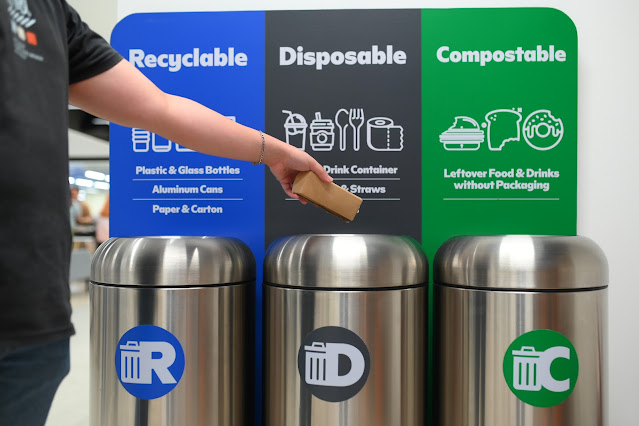 |
The SM Waste-Free
Future initiative endeavors to reduce waste generation and increase the rate of
diversion. |
It is not "out of sight, out of mind"; landfills are not only unsightly places in isolated locations; they also provide a serious health danger to the local population and release a lot of greenhouse gases due to the decomposition of food waste.
The SM Supermalls' Recyclable, Disposable, and Compostable (RDC) containers are not merely decorative; they mark the beginning of the path to a landfill that is net-zero and beyond.
The "Trash to Cash" recycling market, one of SM's programs for recyclable garbage, effectively collects more than 1 million kg of plastic, paper, and other materials each year for recycling or reuse. The program's objectives are to lessen pollution from solid waste and encourage a circular economy in local areas. Because SM recognizes the value of separating at the source, it collaborates with a number of businesses, including Trust International Paper Corporation, to recycle large quantities of paper internally. By making sure recyclables are processed correctly, the program has prevented landfill waste equal to the yearly waste of over 3,000 households.
SM Prime and GUUN, a Japanese environmental solutions company, established SM GUUN Environmental Company, Inc. (SGECI) as a joint venture handling disposable, non-recyclable waste. In order to reduce the consumption of coal, this collaboration improves its waste-to-fuel factory, which turns non-recyclable waste—such as single-use plastics, non-recyclable paper, and used rags—into cement fuel known as "fluff fuel." An essential component of the waste reduction ecosystem, the "fluff fuel" is then utilized by environmentally minded cement companies such as APO Cement, Holcim, and Taiheiyo Cement in a process they refer to as "co-processing," in which the ash from the fuel is also used as a cement ingredient.
More than 6,000 metric tons of non-recyclable waste were turned into "fluff fuel" by SM GUUN Environmental Company in 2024, sparing 12,000 homes from the yearly burden of landfills. During a recent visit, the Department of Environment and Natural Resources (DENR) acknowledged the facility's importance to a number of stakeholders, especially in terms of lowering their carbon footprints and effectively managing solid waste.
For its malls and hawker centers, SM GUUN is testing a Singaporean technology for biodegradable trash that turns food scraps into landscape soil, reducing the volume by more than 70% in just 48 hours. This lessens the load on landfills and promotes soil health and urban greenery by helping to produce fresh soil for parks, gardens, and golf courses.
Other customer-facing solid waste management initiatives offered by SM include the Plastic Waste Collection program, E-Waste Collection, clean water body awareness campaigns, and frequent cleanups of the coast and estero. Through RA 9004, RA 11898, and other comparable laws, these activities are also carried out to assist the government in promoting appropriate solid waste management.
With solutions identified, the journey towards SM’s #SMWasteFreeFuture becomes more realistic. It needs the help of everyone--from the proper way we “Bin it Right” to the further development of waste solutions to create an ecosystem of recovery and consumption where the word “waste” can be a thing of the past. Let’s do our part for the journey to a “waste-free future.”
To learn more about SM’s solid waste management initiatives, visit https://www.smsupermalls.com/smcares/events/environmental-programs-on-solid-waste-management.

No comments:
Post a Comment